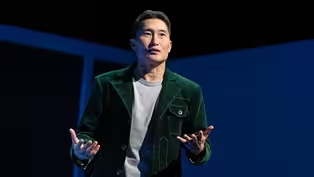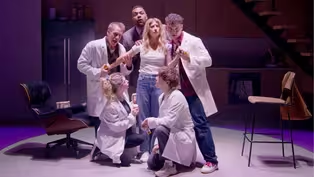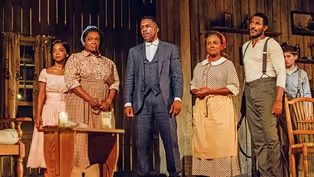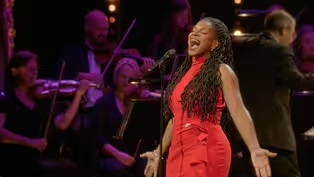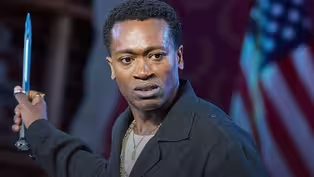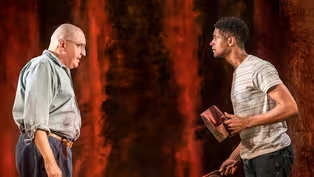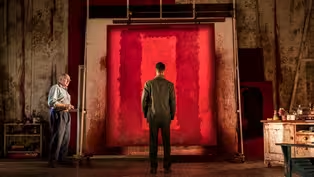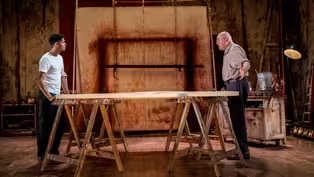
Red
Season 47 Episode 8 | 1h 32m 35sVideo has Closed Captions
Under the watchful gaze of his young assistant Rothko takes on his greatest challenge yet.
Under the watchful gaze of his young assistant—and the growing competitive presence of a new generation of artists—Rothko takes on his greatest career challenge yet: to create a definitive series of paintings for the Philip Johnson-designed Four Seasons restaurant in architect Mies van der Rohe’s iconic Seagram Building.
Problems playing video? | Closed Captioning Feedback
Problems playing video? | Closed Captioning Feedback
Major series funding for GREAT PERFORMANCES is provided by The Joseph & Robert Cornell Memorial Foundation, the Anna-Maria and Stephen Kellen Arts Fund, the LuEsther T. Mertz Charitable Trust, Sue...

Red
Season 47 Episode 8 | 1h 32m 35sVideo has Closed Captions
Under the watchful gaze of his young assistant—and the growing competitive presence of a new generation of artists—Rothko takes on his greatest career challenge yet: to create a definitive series of paintings for the Philip Johnson-designed Four Seasons restaurant in architect Mies van der Rohe’s iconic Seagram Building.
Problems playing video? | Closed Captioning Feedback
How to Watch Great Performances
Great Performances is available to stream on pbs.org and the free PBS App, available on iPhone, Apple TV, Android TV, Android smartphones, Amazon Fire TV, Amazon Fire Tablet, Roku, Samsung Smart TV, and Vizio.
Buy Now
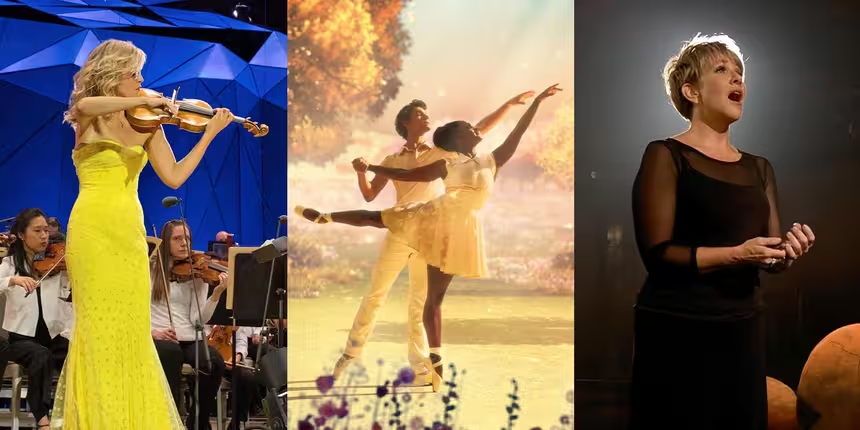
Great Performances Newsletter
Subscribe to the Great Performances newsletter to keep up with the latest full episodes to stream, exclusive content, and more!Providing Support for PBS.org
Learn Moreabout PBS online sponsorshipMore from This Collection
Find your front row seat at home and watch acclaimed Broadway productions, from Noël Coward’s Present Laughter to 42nd Street.
Video has Closed Captions
Experience this Cole Porter classic musical starring Tony winner Stephanie J. Block. (2h 24m 55s)
Video has Closed Captions
Experience this musical by Conor McPherson featuring the music of Bob Dylan set in 1934 Minnesota. (2h 13m 31s)
Video has Closed Captions
Enjoy Tony winner David Henry Hwang’s Broadway comedy starring Daniel Dae Kim. (1h 45m 43s)
Video has Closed Captions
Experience this Tony and Pulitzer Prize-winning Broadway musical from London's Donmar Warehouse. (2h 9m 46s)
Rodgers & Hammerstein's 80th Anniversary
Video has Closed Captions
Features an all-star cast at London’s Theatre Royal Drury Lane. (1h 55m 25s)
Video has Closed Captions
The comedic play tells the story of a Black preacher’s scheme to reclaim his inheritance. (1h 45m 24s)
Audra McDonald at the London Palladium
Video has Closed Captions
Audra McDonald performs a repertoire of classic Broadway songs at the London Palladium. (1h 22m 24s)
Video has Closed Captions
Experience this Shakespearean classic directed by Tony Award winner Kenny Leon. (2h 33m 19s)
Video has Closed Captions
Experience Shakespeare’s tragedy recorded from Central Park starring Danai Gurira. (2h 19m 49s)
Providing Support for PBS.org
Learn Moreabout PBS online sponsorship-Next, Alfred Molina takes on the establishment, his rivals, and art itself as the American abstract expressionist painter Mark Rothko.
-Oh, you think Andy Warhol's gonna be hanging in museums in 100 years alongside the Bruegels and Vermeers?
Yeah, just a pinch of black.
-Alfred Enoch plays his assistant challenging Rothko's very perception of their craft.
-You can try to kid yourself you're making a holy place of contemplative awe, but in reality you're just decorating another dining room for the super rich.
-I'm here to stop your heart!
I'm here to make you think!
I'm not here to make pretty pictures!
-Alfred Molina and Alfred Enoch in John Logan's "Red."
[ Indistinct conversations ] [ Indistinct conversations continue ] [ Conversations fade ] ♪♪ ♪♪ ♪♪ ♪♪ ♪♪ ♪♪ ♪♪ ♪♪ -What do you see?
No.
Wait.
Stand closer.
You got to get close.
Let the picture pulsate.
Let it work on you.
Closer.
♪♪ Nah.
Too close.
There.
Let it spread out.
Let it wrap its arms around you.
Let it embrace you, filling even your peripheral vision so nothing else exists or has ever existed or will ever exist.
Let the picture do its work.
But work with it.
Meet it halfway, for God's sake.
Lean forward.
Lean into it.
Engage with it.
Now, what do you see?
Oh, no, no.
Wait.
Wait, wait.
♪♪ Now, what do you see?
Be specific.
No.
No.
Be exact.
Be exact, but sensitive.
You understand?
Be kind.
Be a human being.
That's all I can say.
Be a human being, for once in your life.
These pictures deserve compassion, and they live or die in the eye of the sensitive viewer.
They quicken only if the empathetic viewer will let them.
That is what they cry out for.
That is why they were created.
That is what they deserve.
Now, what do you see?
-Red?
-But do you like it?
-Mm, I -- -Yeah, speak up!
-Yes!
-Yes, yes, of course, you like it.
How can you not like it?
Everyone "likes" everything nowadays.
They like the television and the phonograph and the soda pop and the shampoo and the Cracker Jack.
Everything becomes everything else.
It's all nice and pretty and likable.
Everything's fun in the sun, huh?
Where's the discernment?
Where's the arbitration that separates what I like from what I respect, what I deem worthy, what -- listen to me now -- what has significance.
Ah, maybe this is a dinosaur talking.
Maybe I'm just a dinosaur, sucking up the oxygen from you cunning little mammals hiding in the bushes, waiting to take over.
Maybe I'm speaking a lost language unknown to your generation, but a generation that does not aspire to seriousness, to meaning, is unworthy to walk in the shadow of those who have gone before.
I mean those who have struggled and surmounted.
I mean those who have aspired.
I mean Rembrandt.
I mean Turner.
I mean Michelangelo and Matisse.
I mean, obviously, Rothko.
[ Laughter ] Do you aspire?
-Yes.
-To what?
To what do you aspire?
-I want to be a painter, so I guess I aspire to... painting.
-Then those clothes won't do.
No.
We work here.
Hang up your jacket outside.
No, no.
I appreciate you put on your Sunday clothes to impress me.
It's poignant, really.
It touches me, but it's ridiculous.
We work hard here.
This isn't a...damn old-world salon with tea cakes and lemonade.
Go hang up your jacket outside.
Sidney told you what I need here?!
-Yes.
-We start every morning at 9, and we work until 5, just like bankers.
You'll help me stretch the canvases, mix the paints, clean the brushes, build the stretchers, move the paintings, also help apply ground color, which is not painting.
So any lunatic assumptions you make in that direction, you need to banish immediately.
You'll pick up food, cigarettes, anything else I want, any whim, no matter how demanding or demeaning.
You don't like that?
You can leave right now.
Answer me -- yes or no?
-Yes!
-Consider I'm not your rabbi.
I'm not your father.
I'm not your shrink.
I'm not your teacher.
I'm not your friend.
I am your employer.
You understand?
-Yes.
-As my assistant, you're going to see many things here, many ingenious things, but they're all secret.
You cannot talk about any of this.
Don't think I don't have enemies, because I do, and I don't just mean those other painters and gallery owners and museum curators and...damn son-of-a-bitch art critics, not to mention that vast panoply of disgruntled viewers who loathe me and my work because they do not have the heart nor the patience nor the capacity to think, to understand because they're not even human beings, like we talked about.
You remember?
-Yes!
-I'm painting a series of murals now.
I'll probably do 30 or 40 then choose which work best in concert, like a fugue.
You'll help me put on the undercoat.
Then I'll paint them.
Then I'll look at them.
Then I'll paint some more.
I do a lot of layers, one after another, like a glaze, slowly building the image like pentimento, letting the luminescence emerge until it's done.
-How do you know when it's done?
-There's tragedy in every brushstroke.
-Ah.
-Swell.
Let's have a drink.
Answer me a question.
Don't think about it.
Just say the first thing that comes into your head, no cognition.
-Okay.
-You ready?
-Yeah.
-Who's your favorite painter?
-Jackson Pollock.
-Oh.
-Sorry!
-No, no, no.
-Let me do it again!
-No.
Forget it.
-Come on.
-No, no.
It's silly.
-Come on.
Ask me again.
-Who's your favorite painter?
-Picasso.
[ Laughter ] -Pollock.
It's always Pollock.
Oh, don't get me wrong.
He was a great painter.
We came up together.
I knew him very well.
-What was he like?
-You read Nietzsche?
-What?
-You ever read Nietzsche, "Birth of Tragedy"?
-No.
-And you call yourself an artist?
One can't discuss Pollock without it.
One can't discuss anything without it.
What do they teach you in art school now?
-I -- -You read Freud?
-No.
-Jung?
-Well -- -Byron?
Wordsworth?
Aeschylus?
Turgenev?
Sophocles?
Schopenhauer?
Shakespeare?
"Hamlet"?
Oh, please, God.
At least "Hamlet."
Quote me "Hamlet" right now.
-"To be or not to be?
That is the question."
-Is that the question?
-I don't know!
-You've got a lot to learn, young man.
Philosophy, theology, literature, poetry, drama, history, archaeology.
Anthropology, mythology, music.
Come on.
These are your tools, as much as brush and pigment!
You cannot be an artist until you are civilized.
You cannot be civilized until you learn.
To be civilized is to know where you belong in the continuum of your art and your world.
To surmount the past, you must know the past.
-I thought you weren't my teacher.
-Ah, and you should be so blessed I talk to you about art.
How do you feel?
-How do I feel?
-How do they make you feel?
-Give me a second.
-So?
-Give me a second.
Disquieted.
-And... -Thoughtful.
-And... -Uh, sad.
-Tragic.
-Yeah.
-Yeah.
They're for a restaurant.
-What?
[ Laughter ] -They're for a restaurant.
So, I'm minding my own business when Mr. Philip Johnson calls me.
You know Mr. Philip Johnson, the world-renowned architect?
-Not personally.
-Yeah, of course you don't know him personally.
You don't know anyone personally.
Don't interrupt.
Mr. Philip Johnson.
He's designing the new Seagram Building on Park Avenue, he and Mies van der Rohe.
Ho-ho.
These are names with which to conjure, are they not?
Philip Johnson, Mies van der Rohe.
These are titans in their field, revolutionists.
Together, they are making a building unlike anything the world has yet seen, reflecting the golden ambitions of not only this city and its inhabitants but of all mankind.
In this building, there is to be a restaurant called the Four Seasons, like the Vivaldi, and on the walls of this restaurant... $35,000, they're paying me.
No other painter comes close.
My first murals.
Imagine a frieze all around the room, a continuous narrative filling the walls, one to another, each a new chapter, the story unfolding.
You look, and they are there, inescapable and inexorable.
Like doom.
-Are these ones done?
-They're in process.
I have to study them now.
-Study them?
-Yeah, most of painting is thinking.
Did anybody teach you that?
Ten percent is putting paint on canvas.
The rest is waiting.
All my life, I've wanted just this, my friend -- to create a place, a place where the viewer could live in contemplation with the work, give it some of the same attention and care that I gave it, like a chapel, a place of communion.
-But it's a restaurant.
-No.
I will make it a temple.
♪♪ ♪♪ ♪♪ ♪♪ ♪♪ ♪♪ ♪♪ ♪♪ ♪♪ ♪♪ ♪♪ ♪♪ ♪♪ ♪♪ ♪♪ ♪♪ ♪♪ ♪♪ ♪♪ ♪♪ Rembrandt and Rothko.
Rembrandt and Rothko.
Rothko and Rembrandt.
Rothko and Rembrandt.
And Turner.
Rothko and Rembrandt and Turner.
Rothko and Rembrandt and Turner.
-Oh, my.
[ Laughter ] The Chinese place is closing.
-Yeah, everything worthwhile ends.
We're in the perpetual process now -- creation, maturation, cessation.
-There's another Chinese around the corner.
-Oh, the eternal cycles grind on.
Generations pass away, hope turns arid, but there's another Chinese around the corner.
-Not much for small talk.
-Yeah, it's small.
-I went to the Modern last night, saw the Picasso show.
-And...?
-I don't think he's so much concerned with generations passing away.
-Oh, don't kid yourself, kid.
That man, though now a charlatan, of course, signing menus for money like Dalí when he's not making those -- those ugly little pots also for money.
That man, at his best, understood the workings of time.
Where's the receipt?
Ah, it's tragic, really, to grow superfluous in your own lifetime.
We destroyed Cubism, de Kooning and me and Barnett Newman, Smith, all the others.
We stomped it to death.
Nobody can paint a Cubist picture today.
-You take pride in that?
Stomping Cubism to death?
-The child must banish the father, respect him but kill him.
-And enjoy it?
-It doesn't matter.
Just be audacious and do it.
You know, courage in painting is not facing a blank canvas.
It's facing Manet.
It's facing Velasquez.
All we can do is move beyond what was there to what is here and hope to gain some intimation of what will be here.
"What is past and passing and to come."
That's Yeats, whom you haven't read.
-Come on, but Picasso was -- -Picasso, I thank for teaching me that movement is everything.
Movement is life.
The second we're born, we squall.
We writhe.
We squirm.
To live is to move.
Now, without movement, paintings are what?
-Dead?
-Yeah, precisely.
Look.
Look at the tension between the blocks of color, the dark and the light, the red, the black, and the brown.
They exist in a state of flux, of movement.
They abut each other on the actual canvas.
So, too, do they abut each other in your eye.
They ebb and flow and shift, gently pulsating.
The more you look at them, the more they move.
They float in space.
They breathe.
Movement, communication, gesture, flux, interaction, letting them work.
They're not dead because they're not static.
They move through space if you let them.
Now, this movement takes time, so they're temporal.
They require time.
-They demand it!
They don't work without it.
-This is why it's so important to me to create a place, a place the viewer can contemplate these paintings over time and let them move.
-They need the viewer.
They're not like representational pictures like traditional landscapes or portraits.
-Yeah, tell me why.
-Because they change.
They move.
They pulse.
Representational pictures are unchanging.
They don't require the active participation of the viewer.
In the Louvre, in the middle of the night, the "Mona Lisa" is still smiling.
But do these paintings still pulse when they're alone?
That's why you keep the lights so low!
-Is it?
-To help the illusion.
Like a magician.
[ Gasps ] Like a play, To keep it mysterious, to let the pictures pulsate.
Turn on bright lights, and the stage effect is ruined.
Suddenly, it's nothing but a bare stage with a bunch of fake walls.
[ Switch clicks ] [ Electricity buzzing ] -What do you see?
-My eyes are adjusting.
Just white.
-What does white make you think of?
-Bones, skeletons.
Charnel house.
Anemia.
Cruelty.
-Really?
-It's like an operating theater now.
-How does white make you feel?
-Frightened.
-Why?
-Doesn't matter.
-No, no.
Why?
-It's like the snow... outside the room where my parents died.
It was winter.
I remember the snow outside the window.
White.
And the pictures, in this light, they're flat, vulgar.
This light hurts them.
[ Click ] -Yeah, you see how it is with them, how vulnerable they are?
People think I'm controlling -- controlling the light, controlling the height of the pictures, controlling the shape of the galleries.
It's not controlling.
It's protecting.
A picture lives by companionship.
It dies by the same token.
Ah, it's a risky act to send it out into the world.
♪♪ ♪♪ -You ever paint outdoors?
-Oh, you mean out in nature?
-Yeah.
-Nature doesn't work for me.
The light's no good.
[ Laughter ] And all those bugs?
No.
Oh, I know.
I know.
Those plein air painters, oh, my God, they'll sing to you endless paeans about the majesty of natural sunlight.
"Get out there, muck around in the grass," they tell you, like a cow.
But when I was younger, I didn't know any better.
I'd go out there with my supplies, and the wind would blow the paper.
The easel would fall over.
Ants would get into my paint.
[ Groans ] But then I go to Rome for the first time.
I go to the Santa María del Popolo to see Caravaggio's "Conversion of Saul," which turns out is tucked away in a dark corner of this dark church with no natural light.
It's like a cave in there, but that painting, it glowed.
With a sort of rapture, it glowed.
Now, consider.
Caravaggio, he was commissioned to paint that picture for that specific place.
He had no choice.
He stands there, and he looks around.
It's like under the ocean, it's so...damn dark.
How's he going to paint here?
He turns to his creator.
"God, help me, unworthy sinner that I am.
Tell me, O Lord on High, what the...do I do now?"
-[ Laughs ] -And then it comes to him -- the divine spark.
He illuminates that picture from within.
He gives it inner luminosity.
That painting, it lives.
It lives, like -- like one of those bioluminescent fish from the bottom of the ocean, radiating its own effulgence.
You understand me?
Caravaggio, he -- Bring me the second bucket.
-Are you really going to paint?
-Now, what the hell do you think I have been doing?
♪♪ Yeah, give me, uh -- give me the black number four and the first maroon.
♪♪ Yeah, just a pinch of black.
♪♪ Yeah, just that amount again.
♪♪ Yeah, twice as much maroon.
♪♪ Ugh.
Oh, come on.
Come on.
Come on.
What does it need?
-Red?
-I wasn't talking to you.
♪♪ Don't you ever do that again!
By what right do you speak?!
By what right do you express an opinion on my work?!
Who the...are you?
What have you done?
What have you seen?
Where have you earned the right to even exist here with me and these things you don't even understand?!
"Red."
Oh, you want to paint the...damn thing?
Go ahead.
Here's some red and red and red, lots of red!
I don't even know what that means.
What the hell does "red" mean to me?!
Oh, you mean scarlet?
You mean crimson?
You mean plum, mulberry, magenta, burgundy, salmon, carmine, carnelian?
How about coral?!
Anything but "red"!
What the hell is "red"?!
-I meant sunrise.
-Sunrise?
-I meant the red at sunrise, the feeling of it.
-Oh, "the feeling of it."
What the hell does that mean, "the feeling of it"?
-I didn't mean red paint only.
I meant the emotion of red at sunrise.
-Sunrise isn't red!
-Yes, it is.
-I'm telling you it's not!
-Sunrise is red, and red is sunrise.
Red is heartbeat.
Red is passion.
Red wine, red roses, red lipstick.
Beets, tulips, peppers.
-Arterial blood.
-That too.
-Rust on the bike on the lawn.
-And apples.
And tomatoes.
-Dresden firestorm at night, the sun in Rousseau, the flag in Delacroix, the robe in El Greco.
-A rabbit's nose, an albino's eyes, a parakeet.
-Florentine marble, atomic flash.
Nick yourself shaving, blood in the Barbasol.
-The ruby slippers, technicolor, that phone to the Kremlin on the president's desk.
-Russian flag, Nazi flag, Chinese flag.
-Persimmons, pomegranates, red-light district, red tape, rouge.
-Lava, lobsters, scorpions!
-Stop signs, sports car, a blush!
-Viscera, flames, dead Fauvists!
-Traffic lights, Titian hair.
-Slash your wrists, blood in the sink.
-Santa Claus.
-Satan!
So... Red?
-Exactly.
-We got more cigarettes?
No.
More than anything, you know what?
-What?
-Matisse's painting "The Red Studio," it's a picture of his own studio.
The walls are a brilliant red.
The floor, the furniture, it's all red.
It's like that color had radiated out of him and swallowed everything up.
When the Modern first put that picture up, I spent hours looking at it.
Day after day, I would go, "Hmm."
You could argue everything I do today, you can trace the bloodlines back to that painting and those hours I spent standing there letting that picture work, allowing it to move.
The more I looked at it, the more it pulsated around me.
I was saturated.
It swallowed me.
Oh, such plains of red he made, such energetic blocks of pure color, such emotion.
He -- Yeah, it was a long time ago.
-It's still there.
-I can't look at it now.
-Why?
-It's too depressing.
-How could all that red be depressing?
-I don't see the red anymore.
Even in that painting, that total and profound immersion in red, it's there -- the mantel above a dresser, just over the centerline, set off by yellow of all...damn things.
He wanted it inescapable.
-What?
-Black.
-The color black?
-No, the thing black.
There's only one thing in life I fear, my friend -- one day, the black will swallow the red.
♪♪ ♪♪ ♪♪ ♪♪ ♪♪ ♪♪ ♪♪ ♪♪ ♪♪ ♪♪ ♪♪ ♪♪ ♪♪ ♪♪ ♪♪ ♪♪ ♪♪ ♪♪ ♪♪ ♪♪ ♪♪ -[ Chuckles ] That's easy for you to say.
You don't know him.
I'll show it to him if I think the moment's right.
He knows I'm a painter.
He's got to be expecting it, right?
No.
No.
It depends on his mood.
Don't tell me what to do.
You're just like him.
[ Door closes ] He's here.
Uh, I'll tell you how it goes.
Pray for me.
[ Laughs ] ♪♪ Good morning!
-Morning.
I got the other maroon.
I'll take over.
You finish the canvas.
I'll just go change.
I went by the Seagram Building last night!
It's coming along.
-How's the restaurant?
-Still under construction, but they took me around.
I got a sense of it.
-And...?
-Too much natural light, as always, but it'll work.
You'll be able to see the murals from the main dining room.
I made some sketches.
I'll find them for you.
-You ever worry it's not the right place for them?
-How can it not be the right place for them?
They're being created specifically for that place.
Your logic sometimes baffles me.
♪♪ -So, I read Nietzsche, "Birth of Tragedy," like you said.
-Like I said?
-You said if I wanted to know about Jackson Pollock I had to read "The Birth of Tragedy."
-I said that?
-Yeah.
-I don't remember.
It's very like something I would say.
-So what about Pollock?
-Well, first tell me what you make of the book.
-Interesting.
-Oh, that's like saying "red."
Don't be enigmatic.
You're too young to be enigmatic.
-I think I know why you wanted me to read it.
-Why?
-Because you see yourself as Apollo and you see him as Dionysus.
-Oh, don't be so pedestrian.
Think more.
-Dionysus is the god of wine and excess, of movement and transformation.
This is Pollock.
Wild, rebellious, drunken, and unrestrained.
The raw experience itself.
Apollo is the god of order, method, and boundaries.
This is Rothko.
Intellectual, rabbinical, sober, and restrained.
The raw experience leavened by contemplation.
He splatters paint.
You study it.
He's Dionysus, and you're Apollo.
-Yeah, exactly right but for entirely missing the point.
-How so?
-You missed the tragedy.
The point is always the tragedy.
-For you.
-Whoa, whoa.
What?
You think human beings can be so easily divided into character types?
You think the multifarious complexities and nuances of the psyche, evolving through countless generations, perverted and demented through social neurosis and personal anguish or molded by faith or lack of faith can all be so...damn simple?
"Pollock is emotion.
Rothko is intellect."
Oh, you embarrass yourself.
Think more.
-Maybe it's like one of your paintings.
-Yeah, most things are.
How?
-Dark and light, order and chaos, existing at the same time in the same plain, pulsing back and forth.
We pulse, too.
We're subjects of both Apollo and Dionysus, not one or the other.
We ebb and flow, like the colors in your pictures.
The ecstasy of the Dionysian at war with the restraint of the Apollonian.
-Not at war.
-Not at war?
-It's not really conflict.
More like symbiosis.
-They need each other!
Dionysus' passion is focused -- is made bearable by Apollo's will to form.
In fact, the only way we can endure the sheer ferocity of Dionysus' emotion is because we have the control and intelligence of Apollo.
Otherwise, the emotion would overwhelm us.
So back and forth we go, myth to myth, pulsating.
-Yeah, and the perfect life would be perfectly balanced between the two, everlastingly on that fulcrum.
But our tragedy is we can never achieve that balance.
We exist all of us for all time in a state of perpetual dissonance.
Oh, we long for the raw truth of emotion and can only endure it with the cool lie of reason.
We seek to capture the ephemeral, the miraculous, put it onto canvas, stopping time.
But like an entomologist pinning a butterfly, it dies when we try.
We're foolish that way, we human beings.
We try to make the red black.
-But the black is always there, like the mantle in Matisse.
-Like the snow outside your window.
It never goes away.
And once glimpsed, you can't help but be preoccupied with it, for the intimations of our own mortality are -- Ah, but still we go on, clinging to that tiny bit of hope, that red that makes the rest endurable.
-Or just less unendurable.
-Yeah, well, that's my friend Jackson Pollock.
Finally it was just unendurable.
-What do you mean?
-His suicide.
-He didn't commit suicide.
-Oh.
Didn't he?
-Jackson Pollock died in a car accident.
-[ Chuckles ] A man spends years of his life getting drunk.
Day after day, the guy is hammered.
He then gets into an Oldsmobile convertible, races around these little country roads like a...damn lunatic.
You tell me what that is if not a lazy suicide.
Oh, believe you me, when I commit suicide, there won't be any doubt about it.
No mysterious crumpled car in a ditch.
"Did he?
Didn't he?"
Ah, it gives me a headache, it's so boring.
-When you commit suicide?
-What?
-You said, "When I commit suicide."
-No I didn't.
-Yes, you did.
-You misheard me.
Let me tell you something about your hero.
That man, he confronted his tragedy.
He was valiant in the face of it.
He endured as long as he could, and then he tried to recede from his life.
But how could he?
He was Jackson Pollock.
-What was his tragedy?
-He became famous.
-Don't be glib.
-His muse evacuated.
He grew tired of his form.
He grew tired of himself.
He lost his faith in his viewers.
Take your...damn pick.
He no longer believed there were any real human beings left to even look at pictures.
-How does that happen to a man?
-Oh, better you should ask how occasionally it doesn't happen.
-I mean, he's an artist.
He's in "Life" magazine.
He's young.
He's famous.
He has money.
-Yeah, that's exactly it!
Here's a schmuck from Wyoming who can paint.
Suddenly, he's a commodity.
He's Jackson Pollock.
Let me tell you, kid, that Oldsmobile convertible, it really did kill him.
Not because it crashed.
Because it existed.
Why the...did Jackson Pollock have an Oldsmobile convertible?
-So artists should starve?
-Yes.
Artists should starve.
Except me.
[ Laughter ] -[ Chuckles ] Take a look.
-Yeah.
Hey, you would've loved Jackson.
He was a downtown guy, real bohemian.
No banker's hours for him, believe you me.
Every night with the talking and the drinking and the fighting and the dancing and the staying up late.
He was like everyone's romantic idea of what an artist ought to be.
[ Chuckles ] He was the anti-Rothko.
At his worst, you still loved him, though.
You loved him because he loved art so much.
Jackson thought it mattered.
He thought painting mattered.
Does not the poignancy of that just stop your heart?
How could this story not end in tragedy?
Goya said, "We have art that we may not perish from truth."
Well, Pollock saw some truth, and then he didn't have art to protect him anymore.
Who survives that?
Come on.
Oh, I was walking up to my house last week, and a couple was passing.
The lady looks inside my window and says, "Ooh, I wonder who owns all those Rothkos."
[ Laughter ] Just like that, I've become a noun -- a Rothko.
-A commodity.
-An over-mantle.
-A what?
-The over-mantles.
You know, those paintings doomed to become mere decoration over the fireplace in the fancy-schmancy penthouse.
Oh, they say to you, "I need something to work with the sofa, you understand?
Something bright and cheery for the breakfast nook, which is orange.
You got something in orange?
Or burnt umber or sea-foam green.
Here's a paint chip from the Sherwin-Williams.
Oh, and can you chop it down to fit the sideboard?"
Or worse -- "Darling, I simply must have one because my neighbor has one, that social climbing bitch.
In fact, if she has one, I need three."
Or even worse -- "I got to have one because 'The New York Times' says I got to have one.
Or somebody told me 'The New York Times' says I got to have one because I haven't got time to read 'The New York Times' anymore.
Oh, no, no, no.
Don't make me look at it.
No, I never actually look at it.
It's so...damn depressing.
Jesus.
All those fuzzy rectangles!
My kid could do this in kindergarten.
The whole thing's a scam.
This guy's nothing but a fraud."
Oh, still they buy it.
It's an investment.
It's screwing the neighbors.
It's buying class.
It's buying taste.
It goes with the lamp.
It's cheaper than a Pollock.
It's interior decoration.
It's anything but what it is.
♪♪ ♪♪ Okay.
Good.
Let's, uh -- Let's prime the canvas.
♪♪ ♪♪ ♪♪ ♪♪ ♪♪ ♪♪ ♪♪ ♪♪ ♪♪ ♪♪ ♪♪ [ Slow classical music plays ] [ Scoffs ] [ Music shuts off ] [ Up-tempo classical music plays ] [ Volume increases ] -[ Laughs ] ♪♪ ♪♪ ♪♪ ♪♪ ♪♪ ♪♪ ♪♪ ♪♪ ♪♪ [ Woman singing operatically ] ♪♪ ♪♪ ♪♪ ♪♪ [ Music shuts off ] -[ Breathing heavily ] -That'll do.
Maybe it'll do.
Possibly adequate.
What do you think?
-You mean me?
You want me to answer?
-Who else?
-It's, uh -- It's a good ground.
A good base layer.
Nice and even.
-Yeah, we'll see when it dries.
Then maybe I can start to paint.
-You really care what I think?
-Not at all.
[ Laughter ] What?
-Nothing.
-No.
What is it?
-It's strange.
I'm remembering something.
The, uh, color is... -Is what?
-Doesn't matter.
-Oh, what?
-Dried blood.
When the blood dried, it got darker.
On the carpet.
-Yeah?
Which carpet?
-Where my parents died.
It's exactly the color.
When the blood dried, it got darker.
That surprised me.
I remember being surprised by that.
-Yeah.
What happened to your parents?
-I don't want to talk about it.
-[ Chuckles ] Yes, you do.
[ Lighter clicks ] -They were murdered.
-Did you say murdered?
-Mm.
-Well, how old were you?
-Seven.
This was back in Iowa.
-What happened?
-I honestly don't remember it too well.
-Sure you do.
What do you see?
What do you see?
-I woke up, and the first thing I saw was the snow outside my window.
I was glad it snowed because it was Saturday and I could go sledding.
My dad would take me sledding, me and my sister.
But...
But I didn't smell anything.
That was weird.
Normally my mom would be up, making breakfast.
It was really quiet.
I put on my slippers.
They were those Neolite ones that look like moccasins.
Go into the hall.
Now it's really quiet.
And it's cold.
There's a window open somewhere.
Then I see my sister.
She's just standing in the hallway staring into my parents' room.
The door is open.
My sister... she's standing in a puddle of pee, just staring.
Her eyes...
I go to the door and look in and see the snow first.
Outside the window, so much snow.
Maybe I'll still go sledding.
And then the blood.
The bed's stained with it.
And the wall.
There on the bed.
It was a knife.
Apparently it was a knife, I found out later.
Burglars, I found out.
At least two of them.
But right now I don't know what to do.
I just...see.
I don't want my sister to see any more, my little sister.
I...
I turn around and push her out and shut the door.
The door handle... with blood, is red.
That's all.
-What happened then?
-You mean after that?
Uh, nothing, really.
We went to the neighbors.
They called the police.
-What happened to you two?
-State took us.
Foster homes.
People were nice, actually.
They kept us together, but they shuffled us around a lot.
We were rootless.
She's married to a CPA now.
-Rootless?
-Never belonged.
Never had a place.
-They ever find the guys who did it?
-No.
I paint pictures of them sometimes.
-You paint pictures of the men who killed your parents?
-Mm.
What I imagine them to look like.
-Which is what?
-Huh.
Normal.
-When I was a kid in Russia, I saw the Cossacks cutting people up and tossing them into pits.
At least, I think I remember that.
Maybe someone told me about it.
Or I'm just being dramatic.
It's hard to tell sometimes.
-[ Chuckles ] How old were you when you came here?
-Ten.
We went to Portland.
Lived in the ghetto alongside all the other talky, thinky Jews.
I was Marcus Rothkowitz then.
-You changed your name?
-Yeah, my first dealer said he had too many Jewish painters on his books, so Marcus Rothkowitz becomes Mark Rothko.
Now nobody knows I'm a Jew.
-Can I ask you something?
-Can I stop you?
-Are you really scared of black?
-No, I'm really scared of the absence of light.
-Like going blind?
-Like going dead.
-And you equate the color black with death.
-Doesn't everyone?
-I'm asking you.
-Yes, yes, I equate the color black with the diminution of the life force.
-Black means decay and darkness.
-Doesn't it?
-Because black is the lack of red, if you will.
-Because black is the opposite of red.
Not on the spectrum, but in reality.
-I'm talking about in paintings.
-Well, then talk about painting.
-In your pictures, the bold colors are the Dionysian element, kept in check by the strict geometric shapes, the Apollonian element.
The bright colors are your passion.
Your will to survive.
Your life force.
But if black swallows those bright colors, then you lose that excess and extravagance, and what do you have left?
-Go on.
I'm fascinated by me.
[ Laughter ] -Lose those colors, and you have order with no content.
You have mathematics with no numbers.
Nothing but empty, arid boxes.
-And trust me, as you get older, those colors are harder to sustain.
The palette fades.
We race to catch it before it's gone.
-But -- -What?
-Never mind.
-No.
What?
-You'll get mad.
-Me?
-Ah.
You will!
-And?
-I just think...
It's kind of sentimental to equate black with death.
That seems an antiquated notion.
Sort of romantic.
-Romantic?
-I mean, not honest.
-Really?
-In reality, we both know black's a tool, just like ocher or magenta.
It has no affect.
Seeing it as malevolent is a weird sort of chromatic anthropomorphizing.
-Oh, you think so?
What about equating white with death, like snow?
-That's different.
That's just a personal reaction.
I'm not building a whole artistic sensibility around it.
-Well, maybe you should.
-I really think -- -Use your own life.
Why not?
-It's not that I don't -- -Unless you're scared of it.
-I'm not scared.
-Get into all that white!
-I'm not scared!
It's just self-indulgent.
-If you say so.
-Not all art has to be psychodrama.
-Doesn't it?
-No!
-You paint pictures of the men who killed your parents.
-That's not all I paint.
-Yeah, well maybe it should be.
Then maybe you'd understand what black is.
-Back to that?
-Always.
-At least equating white with death isn't so predictable.
Oh, I'm predictable now?
-Kind of.
-Dishonest and predictable?
-Come on!
[ Scoffs ] A painter gets older, and the color black starts to infuse his work?
Therefore the clichéd declension goes, he's depressed.
He's fearing death.
He's losing touch.
He's losing relevance.
He's saying goodbye.
-Yeah, that's a cliche except for when it's not.
-But it's not true!
-Oh, now you know truth?!
-Look at Van Gogh.
-Oh.
-His last pictures are all color.
He goes out and paints the most ecstatic yellows and blues known to man then shoots himself.
Or Matisse.
His last works were nothing but great shocks of primary colors.
-You admire those colors?
-Absolutely.
-Why?
-Well, Matisse, he was dying.
He knew he was dying, but still he was Matisse.
When he got too ill to hold a paintbrush, he used scissors, cutting up paper and making collages.
He never gave up.
On his deathbed, he was still organizing the color patterns on the ceiling.
He had to be who he was.
-And you think I'm the romantic?
Oh, can't you do any better than that?
Matisse, the dying hero, struggling with his last puny gasp to finish the final masterpiece.
And Jackson Pollock, the beautiful, doomed youth dying like Chatterton in his classic Pietà pose.
Oh, and Van Gogh.
Of course Van Gogh.
Trotted out on all occasions.
The ubiquitous symbol for everything!
Van Gogh, the misunderstood martyr!
You insult these men.
You insult these men when you reduce them to your adolescent stereotypes.
Oh, grapple with them, yes.
Argue with them always.
But don't think you understand them.
Don't think you have captured them.
They're beyond you!
Spend a lifetime with them, a lifetime, you might have one moment of insight into their pain.
Until then, allow them their grandeur in silence.
Silence is so...accurate.
-We need some coffee.
Mind if I go out?
-Go on.
Wait.
In the national gallery in London, there's a painting by Rembrandt.
It's called "Belshazzar's Feast."
It's an Old Testament story from Daniel.
Belshazzar, the king of Babylon, is giving a feast, and he blasphemes, so a divine hand appears and writes some Hebrew words on the wall as a warning.
In the painting, those words, they -- they pulsate from the dark canvas like something miraculous.
Rembrandt's Hebrew was atrocious, as you can imagine, but he wrote, "Mene, mene, tekel, upharsin."
"You have been weighed in the balance and have been found wanting."
That's what black is to me.
What is it to you?
♪♪ ♪♪ ♪♪ ♪♪ ♪♪ ♪♪ ♪♪ ♪♪ ♪♪ ♪♪ ♪♪ ♪♪ ♪♪ ♪♪ ♪♪ ♪♪ ♪♪ ♪♪ ♪♪ ♪♪ ♪♪ ♪♪ ♪♪ [ Jazz music plays on stereo ] ♪♪ ♪♪ -They're trying to kill me!
I swear to God they're trying to kill me, those prosaic insects, those presumptuous, counter-jumping, arriviste sons of bitches!
These are the same...damn walls where I hang.
You appreciate that?
My gallery, my walls, polluted now beyond sanitation, beyond hygiene like the East River choked up with garbage, all that superficial, meaningless sewage right up there on those walls!
This is the same sacred space as De Kooning and Motherwell and Smith and Pollock and -- What is this music?!
-Chet Baker!
-Oh, just when I thought today couldn't get worse!
-It's jazz!
-Yeah, like I care!
When you pay the rent, you can pick the records!
[ Music shuts off ] -So, how did you like the exhibits?
-Oh, those young artists?
They're out to murder me.
-That's kind of extreme.
-Yeah, but not inaccurate.
-You think Jasper Johns is trying to murder you?
-Yes.
-What about Frank Stella?
-Yes.
-Robert Rauschenberg?
-Yes.
-Roy Lichtenstein?
-Which one is he?
-Comic books.
-Yes!
-Andy Warhol?
[ Laughter ] You sound like an old man.
-Yeah, I am an old man.
-Not that old.
-Today I'm old!
-If you say so.
-Look.
My point is, people like me, my contemporaries, my colleagues, all those painters who came up with me, we all had one thing in common.
We understood the importance of seriousness.
-You're too much!
-What?
-You heard me.
-What the hell did you say to me?
-Who are you to assume they're not serious?
-Look at their work!
-I have.
-No, not like you usually look at things like an overeager undergraduate.
-I have.
-Yeah, and what do you see?
-Never mind.
-No.
Never mind, never mind.
What do you see?
-This moment right now.
-What, and all those flags and comic books and...damn soup cans?!
-This moment right now and a little bit tomorrow.
-Oh, you think that's good?
-It's neither good nor bad, but it's what people want.
-Exactly my point!
-So art shouldn't be popular at all now?
-It shouldn't only be popular!
-You may not like it, but nowadays as many people are genuinely moved by Frank Stella as by Mark Rothko!
-Nonsense!
-Don't think so.
-You know the problem with these painters?
It's exactly what you just said.
They're painting for this moment right now, and that's all.
It's nothing but zeitgeist art, completely temporal, completely disposable like Kleenex!
-Like Campbell's Soup, like comic books.
-Oh, you think Andy Warhol's gonna be hanging in museums in 100 years alongside the Bruegels and Vermeers?
-He's hanging alongside Rothko now.
-Because those...damn galleries will do anything for money, cater to any wicked taste!
That's business, young man.
It's not art.
-You ever get tired of telling people what art is?
-No, not ever, until they listen.
What, better you should tell me?
...off.
-You're just mad because the barbarians are at the gate, and what do you know?
People seem to like the barbarians.
-...Damn it.
Of course they like it.
That's the...damn point!
You know what people like nowadays?
You know what they like?
They like happy, bright colors.
They want things to be pretty.
They want things to be beautiful.
Jesus!
When someone tells me one of my pictures is beautiful, I want to vomit!
-What's wrong with -- -Pretty, beautiful, nice, fine.
God!
That's our life now!
Everything's fine.
We put on the funny nose and the glasses, and we all slip on the banana peel, and the TV makes everything happy.
Everyone's laughing all the...damn time.
It's our constitutional right to be amused all the time, isn't it?
We've become a smirking nation living under the tyranny of fine.
How are you?
Fine.
How was your day?
Fine.
How are you feeling?
Fine.
You like the painting?
Fine.
How about some dinner?
Fine.
Well, let me tell you.
Everything is not fine!
How are you?
How was your day?
How are you feeling?
Conflicted?
Nuanced?
Troubled?
Diseased?
Doomed?
I am not fine.
We are not fine.
We're anything but fine.
Look at these pictures.
Look at them!
You see a dark rectangle?
Like a doorway, an aperture?
Yeah, but it's also a gaping mouth letting out a silent howl of something feral and foul and primal and real.
It's not nice.
It's not fine.
It's real!
A moan of rapture!
Something divide or damned!
Something immortal!
Not soup cans and...damn comic books!
Something beyond me and beyond now.
And whatever it is, it's not pretty.
It's not beautiful.
I'm here to stop your heart!
You understand that?!
I'm here to make you think!
I'm not here to make pretty pictures!
Oh.
-So said the Cubist the second before you stomped him to death.
Tragic, really, to grow superfluous in your own lifetime, right?
The child must banish the father, respect him but kill him.
Isn't that what you said?
You guys went after the Cubists and Surrealists, and, boy, did you love it.
And now your time has come, and you don't want to go?
Well, exit stage left, Rothko, because pop art has banished abstract expressionism.
I only pray to God they have more generosity of spirit than you do and allow you some dignity as you go.
Consider.
The last gasp of a dying race.
Futility.
Don't worry.
You can always sign menus for money.
-How dare you!
-Do you know where I live?
-What?
-Do you know where I live in the city?
-No.
-Uptown, downtown, Brooklyn?
-No.
-You know if I'm married?
-What?
-You know if I'm married?
Dating, queer, anything?
-No!
What's it got to -- -Two years I've been working here, 8 hours a day, 5 days a week, and you know nothing about me?
You ever once ask me to dinner, maybe come to your house?
-What's this got to do with -- -You know I'm a painter, don't you?
-I suppose.
-No.
Answer me.
You know I'm a painter?
-Yes!
-Have you ever once asked to look at my work?
-Why should I?
-Why should you?
-You're an employee!
This is all about me!
Everything here is about me!
You don't like that?
Leave.
Oh, is that what this is all about?
Baby feels wounded?
Daddy didn't pat you on the head?
Mommy didn't hug you today?
-Stop it!
-Don't blame me!
I didn't kill them!
-Stop it!
-Oh, go find yourself a psychiatrist and quit whining to me about it!
Your neediness bores me!
-Bores you?
Bores you?!
Christ almighty!
Try working for you for a living!
[ Laughter ] The talking, talking, talking, ...Christ, won't he ever shut up, titanic self-absorption of the man!
You stand there trying to look so deep when you're nothing but a solipsistic bully with your grandiose self-importance and lectures and arias and let's look at the...canvas for another few weeks!
Let's not...paint!
Let's just look!
And the pretension.
...Christ, the pretension.
I can't imagine any other painter in the history of art ever tried so hard to be "significant."
You know not everything has to be so...damn important all the time?
Not every painting has to rip your guts out and expose your soul.
Not everyone wants art that actually hurts.
Sometimes you just want a...still life or landscape or soup can or comic book, which you might learn if you ever actually left your...damn hermetically sealed submarine in here with all the windows closed and no natural light because natural light isn't good enough for you.
But, then, nothing is ever good enough for you, not even the people who buy your pictures.
Museums are nothing but mausoleums.
Galleries are run by pimps and swindlers.
And art collectors are nothing but shallow social climbers.
So who is good enough to own your art?
Anyone?
Or maybe the real question is, who's good enough to even see your art?
Is it just possible no one is worthy to look at your paintings?
That's it, isn't it?
We have all been weighed in the balance and have been found wanting.
You say you spend your life in search of real human beings, people who can look at your pictures with compassion, but in your heart, you no longer believe those people exist, so you lose faith, so you lose hope, so black swallows red.
My friend, I don't think you'd recognize a real human being if he were standing right in front of you.
Never mind!
-Oh, don't give up so easy!
-This isn't a game!
-You do make one salient point, though not the one you think.
-Naturally.
-I do get depressed when I think of how people are gonna look at my pictures, if they're going to be unkind.
Selling a picture is like sending a blind child into a room full of razor blades.
It's going to get hurt.
It's never been hurt before.
It doesn't know what hurt is, which is why I'm looking to do something different with these ones.
They're less vulnerable somehow, more robust, some hues from the earth even to give them strength.
And they're not alone.
They're a series.
They'll always have each other for protection and companionship, and, most important, they're going to a place created just for them, a place of reflection and safety.
-A place of contemplation.
-Yes.
-A place with no distractions.
-Yes.
-A sacred space.
-Yes.
-A chapel.
-Yes.
-Like the Four Seasons Restaurant?
At least Andy Warhol gets the joke.
-No, you don't understand!
-It's a fancy restaurant in a big high-rise owned by a rich corporation.
What don't I understand?
-You don't understand my intention!
-Your intention is immaterial.
Unless you're going to stand there for the rest of your life next to the pictures giving lectures, which you'd probably enjoy, the art has to speak for itself, yes?
-Yes, but -- -Just admit your hypocrisy.
The high priest of modern art is painting a wall in the temple of consumption.
You rail against commercialism in art, but, pal, you're taking the money.
-No, I'm doing more than -- -Sure, you can try to kid yourself you're making a holy place of contemplative awe, but in reality, you're just decorating another dining room for the super rich, and these things are nothing but the world's most expensive overmantels.
-Why do you think I took this commission?
-It appealed to your vanity.
-How so?
-They could've gone to De Kooning.
They went to you!
It's the flashiest mural commission since the Sistine Chapel.
-Oh, you would've turned it down?
-In a second.
-Easy for you to say.
-You know what it is?
It's your Oldsmobile convertible.
Come on.
You don't need the money.
You don't need the publicity.
Why make yourself a hypocrite for the Seagram Corporation?
-I did not enter into this capriciously!
I thought about it!
-No kidding.
-And, of course, it appealed to my vanity.
Come on.
I'm a human being, too.
But still I hesitated.
And the very same thoughts.
Is is immoral?
Is it corrupt?
Am I feeding the whims of the bourgeoisie?
Should I even do it?
I know that place is where the richest bastards in New York will come to feed and show off, and I hope to ruin the appetite of every son of a bitch who eats there!
-You mention this to the Seagrams people?
-It would be a compliment if they turn the murals down.
They won't.
You want a drink?
-Sure.
I don't know.
-What?
-I don't know that I believe you.
-About what?
-Them, this malicious intent of yours, the old lion still roaring, still trying to provoke, to be relevant, stick it to the bourgeoisie.
It doesn't scan.
-Too romantic for you?
-Too cruel to them.
Your paintings aren't weapons.
You would never do that to them, never reduce them like that.
Maybe you started the commission thinking that way, but... then art happened.
You couldn't help it.
That's what you do.
So now you're stuck.
You've painted yourself into a corner.
You should forgive the expression.
-No.
You're wrong.
Their power will transcend the setting.
Working together, moving in rhythm, whispering to each other, they will still create a place.
Oh, you think I'm kidding myself?
You think this is all an act of monumental self-delusion?
Answer me.
Answer me.
-Yes.
I'm fired, aren't I?
-Fired?
This is the first time you've existed.
[ Laughter ] I'll see you tomorrow.
[ Laughter ] -[ Exhales sharply ] [ Jazz music plays on stereo ] ♪♪ ♪♪ ♪♪ ♪♪ ♪♪ ♪♪ [ Jazz music fades into classical music ] ♪♪ ♪♪ ♪♪ ♪♪ ♪♪ ♪♪ ♪♪ ♪♪ ♪♪ ♪♪ ♪♪ ♪♪ ♪♪ [ Man singing operatically ] ♪♪ -Can I lower the music?!
[ Volume decreases ] ♪♪ ♪♪ ♪♪ -[ Groans ] -Ooh!
Oh, Christ!
-I was going to paint!
-Obviously!
...Christ!
You want a towel or something?
Maybe a paintbrush?
♪♪ ♪♪ ♪♪ ♪♪ [ Music fades out ] ♪♪ ♪♪ ♪♪ ♪♪ ♪♪ -I went there.
-What?
-The Four Seasons Restaurant.
-Oh... -After our chat yesterday.
I went there for dinner.
-Ah.
-It's been open a couple weeks now.
Thought I should finally take a look.
-And...?
-You go in from 52nd, and then you go up some stairs to the restaurant.
You hear the room before you see it -- glasses clinking, silverware, voices hushed here but building as you get closer.
It's a desperate sound like forced gaiety at gunpoint.
You go in, feel fat, feel underdressed, feel too...damn Jewish for this place.
Give your name.
Pretty hostess gives you a look that says, "I know who you are, and I'm not impressed.
We get millionaires in here, pal."
She snaps for the maitre d', who snaps for the captain, who snaps for the head waiter, who brings you through the crowd to your table, heads turning.
Everyone looking at everyone else all the time like predators.
"Who are you?
What are you worth?
Do I need to fear you?
Do I need to acquire you?"
Wine guy comes, speaks French.
You obviously don't understand.
He doesn't care.
You embarrass yourself ordering something expensive just to impress the wine guy who goes unimpressed.
And then... you can't help it.
You start hearing what people are saying all around you.
That's the worst of all -- the voices.
It's the chatter of monkeys and the barking of jackals.
It's not human.
And everybody's clever.
Everybody's laughing.
No one looks at anything.
No one thinks about anything.
All they do is chatter and bark and eat.
And the knives and forks click and clack, and the words cut, and the teeth snap and snarl, and in that place... there... will live my paintings... for all time.
I wonder... Do you think they'll ever forgive me?
-They're only paintings.
-Turn that off, would you?
♪♪ [ Music shuts off ] Yeah, Mr. Philip Johnson, please.
This is Mark Rothko on the line.
Philip, this is Rothko.
Listen.
I went to the restaurant last night, and let me tell you, anyone who eats that kind of food for that kind of money in that kind of joint will never look at a painting of mine.
No, I-I'm sending the money back, and I'm keeping the pictures.
No offense.
Yeah, well, this is the way it goes.
Good luck to you, buddy.
[ Receiver bell dings ] -Now... Now you are Mark Rothko.
-Only poorer.
[ Laughter ] -Ohh!
Having money doesn't make you wealthy.
-It helps, though.
-This is a day for the books!
-You're fired.
-What?
-You're fired.
-Why?
-Doesn't matter.
-It does!
-Write down your address.
I'll send you your final check.
-You owe me an explanation.
-No, I don't owe you anything.
-Two years, and you expect me to walk out just like that?
-Oh, you want a retirement party?
-I want a reason.
-It's none of your business!
-I want a reason!
-You're too...damn needy!
All right?!
I don't need it.
I don't need your need.
Since you're 7 years old, you've been looking for a home.
Well, this is not it, and I'm not your father.
Your father's dead, remember?
I'm sorry, but that's it.
-Come on, Dr. Freud.
You could do better.
Why?
-I told you why!
-Why?
-Because I don't need an assistant!
-Bull... -Because you talk too much.
-So do you!
-Because you have lousy taste.
-Bull... -Because I'm sick of you!
-Bull... -Because your life is out there!
Listen to me, kid.
You don't need to spend any more time with me.
You got to find your own contemporaries.
Make your own world, your own life.
You got to get out there, now, into the thick of it.
Shake your fist at them.
Talk their ears off.
Make them look!
Wh-- When I was your age... art was a lonely thing.
There were no galleries, no collecting, no critics, no money.
We didn't have parents.
We didn't have mentors.
We were alone.
But it was a great time because we had nothing to lose and a vision to gain.
Okay?
-Okay.
Thank you.
-Make something new.
What do you see?
-Red.
[ Soft piano music plays ] ♪♪ ♪♪ ♪♪ ♪♪ [ Cheers and applause ] [ Cheers and applause ] [ Cheers and applause ] -To find out more about this and other "Great Performances" programs, visit pbs.org/greatperformances.
Find us on Facebook and follow us on Twitter.
[ Cheers and applause ] [ Cheers and applause ] [ Cheers and applause ]
Video has Closed Captions
Clip: S47 Ep8 | 1m 45s | Ken arrives to the studio and meets Rothko for the first time. (1m 45s)
Video has Closed Captions
Preview: S47 Ep8 | 30s | Under the watchful gaze of his young assistant Rothko takes on his greatest challenge yet. (30s)
Rothko's Rant on Other Artists
Video has Closed Captions
Clip: S47 Ep8 | 1m 47s | Rothko and Ken debate the longevity of modern art. (1m 47s)
Providing Support for PBS.org
Learn Moreabout PBS online sponsorship
- Arts and Music

Innovative musicians from every genre perform live in the longest-running music series.













Support for PBS provided by:
Major series funding for GREAT PERFORMANCES is provided by The Joseph & Robert Cornell Memorial Foundation, the Anna-Maria and Stephen Kellen Arts Fund, the LuEsther T. Mertz Charitable Trust, Sue...


